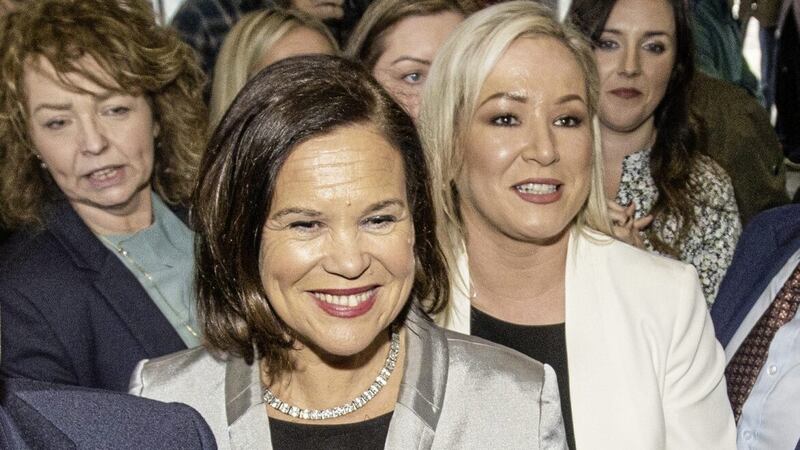When Leo Varadkar replaces Micheál Martin as taoiseach on December 17 it will, I think, trigger what is going to be a very long election campaign: in which the main target for Fine Gael and Fianna Fáil (singly, as well as in coalition) will be Sinn Féin.
Varadkar had quite a pop earlier this month: “I don’t think we can have a taoiseach in this country who is unable to say that the killing of innocent children, guards, prison officers, members of the Defence Forces is not a crime. If she wants to say it was a war and they were war crimes, fair enough, but she has to be able to say that.”
Hmm. I was struck by the fact that he didn’t mention what the IRA did in Northern Ireland between 1969 and 1997 (when it declared its second ceasefire). No mention of the security forces and prison officers murdered here. No mention that the IRA was responsible for half of all deaths. No mention of Michelle O’Neill’s ‘there was no alternative’ comments. Indeed, why could he not say, “I don’t think we can have a taoiseach in this country, or a first minister in Northern Ireland….”
Let’s face it, Sinn Féin is an all-island/Ireland party. Mary Lou McDonald is the leader of that party and Michelle O’Neill is the deputy leader. So why does Varadkar make a distinction between them. If it is unacceptable for McDonald to be taoiseach then why is it not similarly unacceptable for O’Neill to be first minister? Is it something to do with the fact that Sinn Féin is the largest party in Northern Ireland, with dibs on the first minister’s post? Is it something to do with the fact that Sinn Féin—like the DUP, of course—has a veto on assembly/executive formation and that he can’t be seen to try and exclude it from the top post? Or is it something to do with the fact that what happens in Northern Ireland is, unlike the Republic, a matter for a British government, too?
He went further: “We will not consider coalition with Sinn Féin. Oil and water don’t mix. It’s not just about the past, although those issues are important. It’s more about the future.” The difficulty with his logic is that he seems to be saying that it’s ok for Sinn Féin to contest elections in the Republic, to become the largest party, to become the lead party of the opposition and maybe even go into a coalition that doesn’t include Fine Gael. But he would still draw the line at a Sinn Féin taoiseach who will not condemn the IRA.
Some nationalists in Northern Ireland—maybe even a majority of them—might regard his position as fairly similar to the position they believe underpins the present impasse: their belief that the DUP doesn’t want to serve as deputy to a Sinn Féin first minister. The party denies it (saying that if the protocol is resolved they would nominate a deputy), yet a recent LucidTalk poll indicated a considerable majority of nationalists don’t believe it. In other words, it doesn’t matter how electorally successful or far ahead of the DUP Sinn Féin may be, there is a belief unionists will find an excuse to block it from nominating a first minister.
Sinn Féin’s electoral rise over the last decade or so has been an extraordinary thing to observe. No matter how much is thrown at it by its political opponents or by most parts of the mainstream media it just keeps on going. In Northern Ireland a section of unionism/loyalism claim its success here is due to the fact that the media, judiciary, civic society et al has been infiltrated by its supporters and advocates. One well-known veteran loyalist told me quite recently that “the British are enabling their rise…doing everything required to keep them placated or buy them off. It’s all part of a project to destabilise unionists.”
Now, if he is correct in his view, it would suggest that the biggest problem for unionism is not, in fact, Sinn Féin, but rather the British government. Yet his view doesn’t explain the corresponding rise of Sinn Féin in the Republic—unless he believes there’s a plot to destabilise Fine Gael and Fianna Fáil as well!
I’m inclined to the view that Sinn Féin’s rise is more to do with a combination of circumstance (not just Brexit, by the way), relentless campaigning, a general perception that it is now the party to beat and a growing sense that most of the other establishment parties on both sides of the border are dull and lazy. It’s not so much that Sinn Féin has become unstoppable, as that its political/electoral opponents are bombarding it with cheap, headline-catching shots rather that adopting a sustained line-by-line deconstruction of its policies and inability to distance itself from brutal IRA realities.
The other thing to bear in mind is that Sinn Féin still likes to portray itself as some sort of outsider; a mere onlooker to the chaos all around it. It’s a position which suits it very nicely, allowing it to present itself as something new and something different. If its progress is to be halted—a decision resting, ultimately, with the electorates on both sides of the border—then its rivals have to convince growing sections of those electorates that they can do a better job than Sinn Féin. Serial whingeing clearly isn’t working.








